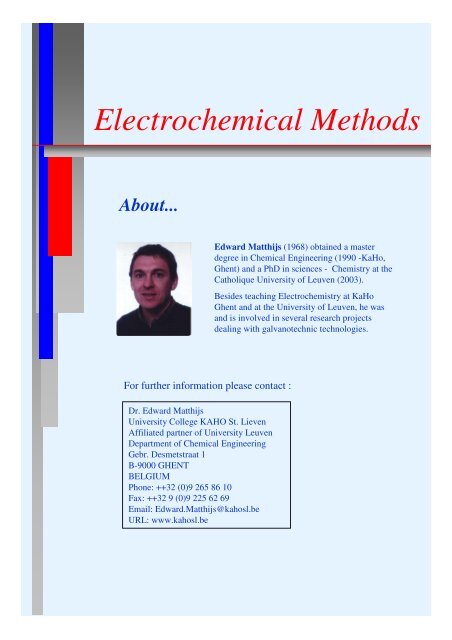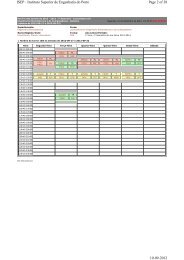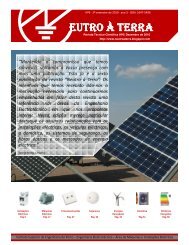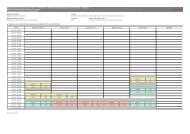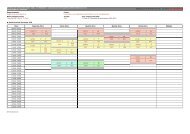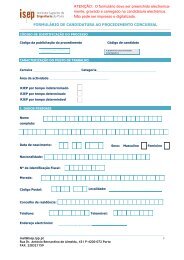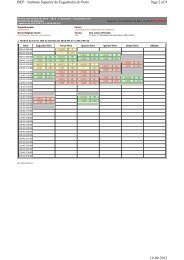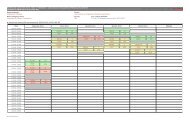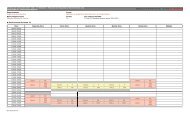Electrochemical Methods
Electrochemical Methods
Electrochemical Methods
Create successful ePaper yourself
Turn your PDF publications into a flip-book with our unique Google optimized e-Paper software.
<strong>Electrochemical</strong> <strong>Methods</strong><br />
About...<br />
Edward Matthijs (1968) obtained a master<br />
degree in Chemical Engineering (1990 -KaHo,<br />
Ghent) and a PhD in sciences - Chemistry at the<br />
Catholique University of Leuven (2003).<br />
Besides teaching Electrochemistry at KaHo<br />
Ghent and at the University of Leuven, he was<br />
and is involved in several research projects<br />
dealing with galvanotechnic technologies.<br />
For further information please contact :<br />
Dr. Edward Matthijs<br />
University College KAHO St. Lieven<br />
Affiliated partner of University Leuven<br />
Department of Chemical Engineering<br />
Gebr. Desmetstraat 1<br />
B-9000 GHENT<br />
BELGIUM<br />
Phone: ++32 (0)9 265 86 10<br />
Fax: ++32 9 (0)9 225 62 69<br />
Email: Edward.Matthijs@kahosl.be<br />
URL: www.kahosl.be
Seminar<br />
<strong>Electrochemical</strong><br />
<strong>Methods</strong>
Abstract<br />
Many developments in modern chemistry rely on electrochemical principles.<br />
However, electrochemistry is not the most accessible field in chemistry. This is<br />
partly due to the fact that electrochemical reactions occur at a surface : things<br />
can become complicated quite fast : an adsorption or desorption step of<br />
reagents or products can be required, the surface can catalyze the reaction,<br />
limitations of material transport towards the surface by diffusion, migration or<br />
convection or chemical reactions preceding or following the electrode reaction<br />
can occur. On the other hand the possibility of an easy control over the<br />
reaction rate of the redox reaction is an undeniable advantage.<br />
Usually, the mechanisms are too complex and limiting cases are saught for.<br />
Some time is required before these approximations can be recognized. The<br />
help of an experienced electrochemist might be advisable. The course does not<br />
intend to overwhelm the attendants with mathematical theories, typical for<br />
fundamental electrochemistry. It is aimed at to give a brief but clear<br />
introduction of the different phenomena occuring at the electrode surface.<br />
Though classic techniques such as polarography are still important for<br />
analytical purposes, many modern electrochemical techniques have recently<br />
been developed for fundamental studies of electrochemical reactions. Cyclic<br />
voltammetry, square wave voltammetry, impedance techniques are widely<br />
accepted methods to study electrochemical problems. Each technique has its<br />
advantages and drawbacks. Again, interpretation of collected data requires<br />
some experience. These modern electrochemical techniques will be treated in<br />
the course. Their strength will be shown with hands-on examples.<br />
Furthermore, some recent developments based on electrochemistry will be<br />
discussed. This includes<br />
- the evolution of battery technology (NiMH, Li-ion, Li-polymer etc.)<br />
- electrodepositions of metals that can impossibly be plated in aqueous<br />
solutions (Ti, Al, Mg etc.), semi-conductors (Si, Ge etc.) or conducting<br />
polymers in ‘ionic liquids’, salts liquid at temperatures lower than 100 °C.<br />
- production of chips and printed circuit boards (PCB’s) with lithographic<br />
techniques<br />
- metallization of plastics<br />
- electrocatalysis and the production of nanoparticles<br />
An English syllabus is available.
Content<br />
Part 1 : Fundamental Aspects of Electrochemistry<br />
1. Thermodynamics of a redox reaction<br />
- the Galvanic cell<br />
- Nernst law<br />
2. Mass-transport controlled reactions<br />
- diffusion, migration and convection to an electrode surface<br />
- diffusion control : the Cottrell equation<br />
- convective transport : the rotating disk electrode<br />
3. Kinetically controlled reactions<br />
- kinetic parameters of an electrochemical reaction<br />
- the Butler - Volmer equation<br />
- Tafel plots<br />
Part 2 : <strong>Electrochemical</strong> <strong>Methods</strong><br />
1. Cyclic Voltammetry<br />
2. Square Wave Voltammetry<br />
3. Chrono-Amperometry<br />
4. Impedance Techniques<br />
Part 3 : Modern <strong>Electrochemical</strong> Applications<br />
1. Battery Technology<br />
2. Electrodepositions in Ionic Liquids<br />
3. Lithographic Techniques in the Production of Chips<br />
4. Metallization of Plastics<br />
5. Electrocatalysis and the Production of Nanoparticles


